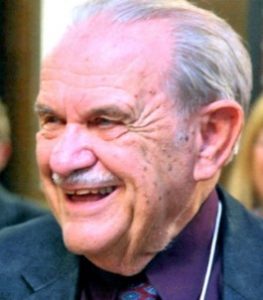Richard L. Handy
International expert in geotechnical engineering with an entrepreneurial perspective and teaching excellence
Inducted 2022
Richard L. Handy first came to Iowa State College in 1947 for his bachelor’s and master’s in geology (1951 and 1953, respectively). Thriving, he continued for his Ph.D. earning a degree in civil engineering (geology and soil engineering) in 1956.
After graduating, he began his 60-year career as a professor at Iowa State. With over 100 academic publications, four books published, 20 patents, and more than 60 graduate students graduating under his mentorship, Handy is an example of impact in CCEE. An entrepreneur, Handy was the founder and president of a company he created called Handy Geotechnical Instruments, Inc. There, Handy received three patents: Drilled Quicklime method for stopping landslides in expansive clay soils; Borehole Shear and Rock Borehole Shear tests for measuring friction and cohesion in soils and rocks; Ko Stepped Blade and pneumatic pressure cells, for rapid measurements of lateral stresses in soils.
Handy was a part of many organizations outside of Iowa State. He is a Fellow of three different memberships, the American Association for the Advancement of Science (1961), the Geological Society of America (1958) . and the Iowa Academy of Science. Handy was also a member of the American Society of Civil Engineers. Handy earned the Anson Marston Distinguished Professor position in 1987 and remained there until becoming a Distinguished Professor Emeritus in the CCEE department in 1991 through retirement. In 2011, 35 former students and colleagues established the Richard L. Handy Professorship, an endowed faculty position in honor of Handy.
With a degree in geology and soil engineering, Handy’s shift from geology to civil engineering gives him a unique perspective of mathematics and natural sciences. In the classroom, he often brought consulting projects to class. One of the stipulations of accepting a consulting project was allowing students to be involved – giving students real-world experience with the guide of the classroom. Handy notes that observing the success of former graduate students, many of whom have been recognized for their significant contributions, was the most rewarding aspect of his profession at Iowa State.

